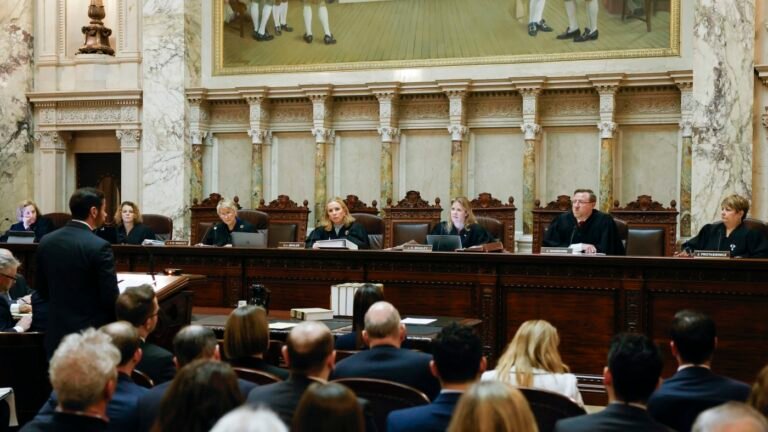The Wisconsin Supreme Courtroom listens to arguments throughout a redistricting listening to on the state Capitol, Nov. 21, 2023, in Madison, Wis. The courtroom determined Wednesday, July 2, 2025, that the state’s 176-year-old legislation doesn’t ban abortion.
Ruthie Hauge/AP/Pool The Capital Instances
cover caption
toggle caption
Ruthie Hauge/AP/Pool The Capital Instances
MILWAUKEE – Supporters of reproductive rights are celebrating a win in Wisconsin. After years of litigation over an 1849 law that conservatives argue criminalizes abortions within the state, the Wisconsin Supreme Courtroom dominated that the legislation doesn’t ban abortion.
This implies abortions can proceed within the state.
It marks the tip of a saga that started when Roe v. Wade was overturned in 2022, ending federal constitutional protections for abortion. Whereas it was clear in some states that abortion could be banned, and in others that abortion could be protected, Wisconsin discovered itself in a authorized grey space.
Due to the 1849 legislation, abortion suppliers within the state stopped providing the process. However Democratic Lawyer Common Josh Kaul sued on the time, difficult the legislation, and the difficulty of learn how to interpret the 1849 statute has been within the courts since June of 2022.
In December 2023, the trial courtroom discovered that the legislation does not outlaw abortions, that it’s truly a feticide legislation that makes it unlawful to assault and kill a lady’s little one with out her consent. Since that ruling, individuals have been capable of get abortions in Wisconsin, as much as 20 weeks or past if essential to avoid wasting the life or well being of the mom, based on a law passed in the 1980s.
The ruling, the dissent and what’s subsequent
On Wednesday, the Wisconsin Supreme Courtroom dominated—alongside ideological traces—that the legislation doesn’t ban abortion. The courtroom has a 4-3 liberal majority, which it maintained after some highly publicized and heavily funded elections for its open seats in 2023 and 2025.
In its ruling, the bulk discovered that the Wisconsin Legislature functionally repealed the 1849 legislation by later legal guidelines regulating abortion. “We conclude that complete laws enacted over the past 50 years regulating intimately the ‘who, what, the place, when, and the way’ of abortion so totally covers the whole topic of abortion that it was meant as an alternative to the nineteenth century near-total ban on abortion,” writes the bulk.
In a dissenting opinion, conservative Justice Annette Ziegler writes, “the bulk picks and chooses which abortion statutes stay in drive,” and calls the opinion “a jaw-dropping train of judicial will.”
Final yr, the court accepted a separate case from Deliberate Parenthood of Wisconsin that argued the statute is a ban and that it is unconstitutional. Wednesday, although, justices dismissed that case as a result of they might solely get to the constitutional query in the event that they dominated the legislation does ban abortion.
Deliberate Parenthood had posited that the 176-year-old legislation conflicts with the provisions within the state structure establishing a proper to life, liberty and the pursuit of happiness in addition to equal safety. So, the constitutional query goes unresolved, based on Bryna Godar, a workers lawyer with the State Democracy Analysis Initiative on the College of Wisconsin Legislation College.
“And so, I believe there will likely be continued conversations about what constitutional protections we’ve in Wisconsin,” says Godar. She says that could possibly be future courtroom instances or constitutional modification poll questions.
Proper now, residents don’t have a way to provoke constitutional amendments by way of poll measures in Wisconsin; solely the Legislature can do this. Wisconsin at present has a divided authorities, made up of a GOP-controlled Legislature and a Democratic governor. So, it is unlikely that the legislature will provoke any poll questions to ascertain constitutional protections for abortion throughout the subsequent yr or, conversely, that the Democratic governor would signal any extra bans into legislation.
However all this might change after the 2026 midterm elections in Wisconsin, when many state legislative seats and the governor’s workplace will likely be up for grabs.

